| Srl | Item |
| 1 |
ID:
149697
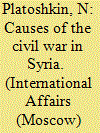

|
|
|
|
|
| Summary/Abstract |
THERE ARE ESSENTIALLY two theories regarding the causes of the civil war in Syria that are being promoted throughout the world by Western propaganda and intelligence agencies, as well as by Western satellites such as the "pillars of democracy" Qatar and Saudi Arabia.
|
|
|
|
|
|
|
|
|
|
|
|
|
|
|
|
| 2 |
ID:
127492
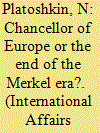

|
|
|
|
|
| Publication |
2013.
|
| Summary/Abstract |
IN GERMANY and outside it, the media spoke and wrote about the results of the German federal elections of September 22, 2013 as a personal triumph of Angela Merkel, the FRG Chancellor since 2005. Journalists hastened to tag her the "Chancellor of Europe." But was she really?
In 2009 and 2013, Angela Merkel led her party to federal elections under the slogan of a right-center coalition (which she personally preferred) with the liberal Free Democratic Party (FDP) which had moved further right on economic issues. In 2009, the German burghers frightened to death by the global financial crisis and financial collapse of several of the Eurozone countries preferred not to change horses in midstream: they voted Merkel. The 2009 elections, however, are better described as a triumph of Free Democrats who showed the historically best 14.8%. Those who voted FDP believed that the "bourgeois-minded" parties are much better suited to look after the country's economy than the "spendthrift" left. The FDP even promised lower taxes on businesses and natural persons.
|
|
|
|
|
|
|
|
|
|
|
|
|
|
|
|
| 3 |
ID:
156342
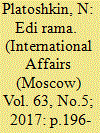

|
|
|
|
|
| Summary/Abstract |
Back in the 15th century, the great Albanian warrior George Castriot, who is also known as Skanderbeg1 (a corruption of the name Iskender Bey given to him by the Turks as a respectful comparison to Alexander the Great), single-handedly fought Ottoman expansion in the Balkans for decades. The pope welcomed Skanderbeg in his residence, and Rembrandt considered it an honor to paint a portrait of him. The West, with its profuse espousal of Christian values, promised help to Albania, but, as usual, failed to keep its word. Incidentally, Skanderbeg was portrayed in the Soviet-Albanian film The Great Warrior Skanderbeg, which came out in 1953 and was directed by Sergey Yutkevich, a Soviet director and screenwriter. The movie was a remarkable event, and what made it so was not only the cinema debut of brilliant Soviet actor Yury Yakovlev but also the directing prize received from the Commission Supérieure Technique of the 1954 Cannes Film Festival. In 2012, the movie was restored to mark the centenary of Albania's independence. It remains the world's best-known film about Albania.
|
|
|
|
|
|
|
|
|
|
|
|
|
|
|
|
| 4 |
ID:
141938
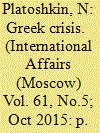

|
|
|
|
|
| Summary/Abstract |
LAZY like all other South Europeans, Greeks have been living beyond the means for many years. This is what the core EU countries (Germany in the first place) and the United States think about the roots and causes of the grave economic crisis in Greece. This answers the first question. The answer to the second has been already supplied by the so-called friends of Greece from among the EU members and the notorious "masters of disasters" of the IMF: The Greeks should trim social spending, tighten their belts and wait for the light at the end of the tunnel.
|
|
|
|
|
|
|
|
|
|
|
|
|
|
|
|
| 5 |
ID:
157255


|
|
|
|
|
| Summary/Abstract |
PARLIAMENTARY ELECTIONS on September 24 were a sad experience for Germany's political heavyweights, the Christian Democratic Union (CDU) and the Social Democratic Party (SPD). Each of them suffered the heaviest defeat in its history, CDU mustering just 32.9% and the SPD 20.5% of votes.1 Angela Merkel lost 8% and Martin Schulz 5% of their regular voters. The Christian Democrats hadn't done so badly since 1949, and the Social Democrats got fewer votes than they had during the reign of Kaiser Wilhelm in 1913. According to a survey, more than 60% of Germans said that they couldn't understand why they needed the SPD at all because there was no difference between its platform and the postulates of the CDU.
|
|
|
|
|
|
|
|
|
|
|
|
|
|
|
|
| 6 |
ID:
130850
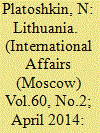

|
|
|
|
|
| Publication |
2014.
|
| Summary/Abstract |
In November 2013, Ukraine and several other former Soviet Republics declined and association with the European Union at the Vilnius Summit of Eastern Partnership.
|
|
|
|
|
|
|
|
|
|
|
|
|
|
|
|